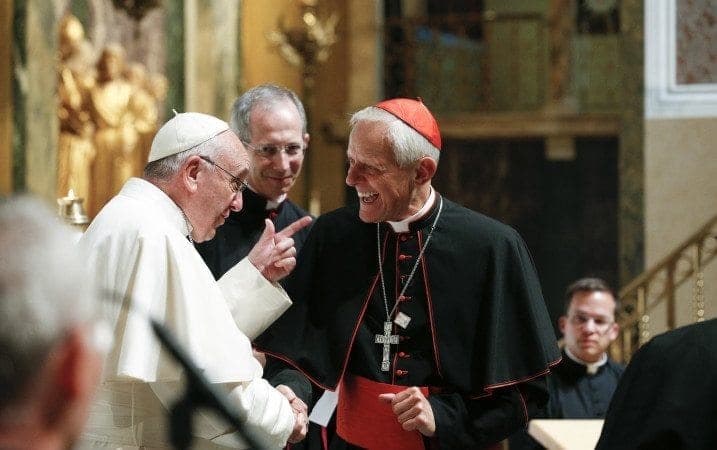Cardinal Donald Wuerl, named by Pope Francis to a drafting team for the reports of his two Synods of Bishops on the family, says the pontiff’s own document concluding the synods make clear that broad Church teaching, and pastoral judgment on how to apply the teaching in individual cases, “are not the same thing.”
In an April 27 talk at the Catholic University of America, Wuerl said last year’s synod “affirmed that there is a difference between the teaching on the indissolubility of marriage, a doctrine of the Church, and the pastoral judgment concerning individuals’ relationships to the sacraments.”
“The two realities are greatly related, but they are not the same,” the Washington, D.C., archbishop said.
Asked whether Francis’ document, Amoris Laetitia, therefore does indeed open the door to Communion for divorced and civilly remarried Catholics, Wuerl stressed the importance of both upholding Church teaching and also fostering discernment in specific cases.
“Those in irregular situations, such as the divorced and civilly remarried, should be invited to deeper inclusion in the life of the Church, but the Holy Father is clear that he is in no way changing the Church’s doctrine, nor making general changes to its sacramental practice or Canon Law,” Wuerl said.
“He is inviting such families, and the pastors who accompany them, to discern what it means for them to walk the path of conversion,” he said.
That call to discernment, Wuerl stressed, doesn’t mean the basic rules have changed.
“The role of the priest in listening and offering affirmation or challenge to persons as they work through their own understanding of their situation, is not the same as absolving from the law,” he said.
Wuerl also stressed that Amoris Laetitia does not represent a break from previous papal teaching.
“The teaching on marriage and human love of Blessed Paul VI, St. John Paul II and Benedict XVI is featured prominently in the document,” he said. “Particularly notable is the rich use of John Paul II’s catechesis on the body and on human love.”
Wuerl said the document reflects a consensus of the world’s bishops who worked together with Pope Francis at the synods in 2014 and 2015.
Noting that it includes numerous citations from the teachings of St. John Paul II, the Second Vatican Council, St. Thomas Aquinas, and the Catechism of the Catholic Church, Wuerl said “while we can refer to Amoris Laetitia as a consensus document, we might also name it a continuity exhortation.”
The Washington cardinal said the distinction between broad Church teaching and the specifics of individual cases reflects the “pastoral tone” of Amoris Laetitia.
“Pope Francis approaches his teaching ministry first and foremost as a pastor of souls,” he said.
“Indeed, in many places in the document, one hears the voice of a pastor speaking directly to members of his flock, sharing his own experience and wisdom formed from many years of service to God’s people.”
In his talk to about 150 students and other members of the Catholic University community, Wuerl emphasized that Pope Francis’ new document encourages a renewal of marriage and family life through “pastoral accompaniment” on the part of the Church and its members, bringing God’s love and mercy to individuals and families in all stages of life.
“For the Holy Father, the pastoral mission of the Church, focused on the lived expression of mercy and love, is expressed in these four principal activities: listening, accompanying, discerning and evangelizing,” the cardinal said.
“He also draws attention to stages of life where this pastoral accompaniment of families is especially important: in preparing for marriage, in the first years after marriage, during times of crisis, in cases of marital breakdown, and when families are touched by death,” Wuerl said.
In response to a question, Wuerl said it’s important for Catholics to invite family members and friends in challenging situations like divorce to come back, where they can be accompanied by their parish priest in pastorally discerning their situation and guided by their conscience on a journey home to the Church.
He urged the Catholic college students to take a lead in that outreach, especially for those whose parents are on the margins of the Church.
“You have the opportunity, with the love you have for your parents, to speak to them about what Christ means to you, and what they mean to you,” the cardinal said.
That kind of conversation, he added, “takes a little courage and a great deal of love.” He noted that Pope Francis’s pastoral approach is, “Go out, love and accompany.”
Wuerl was speaking to a class on the virtues taught by John Garvey, Catholic University’s president.
The cardinal, who as archbishop of Washington serves as the university’s chancellor, also sometimes gives talks to classes there in his role as CUA’s William Cardinal Baum professor of theology – named for Washington’s archbishop from 1973-80, who was a noted theologian and ecumenist.
















